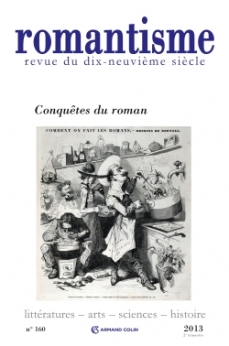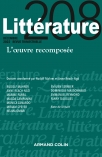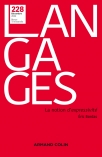
Romantisme n° 160 (2/2013)
Pour acheter ce numéro, contactez-nous
Recevez les numéros de l'année en cours et accédez à l'intégralité des articles en ligne.
Dans les romans de Hugo, Stendhal, Balzac ou encore Flaubert, apparaissent des titres de romans, des noms de romanciers – certains connus, d’autres aujourd’hui oubliés – qui permettent de retracer une généalogie romanesque singulière, dont l’héritage sera plus ou moins avoué. En somme, le roman réaliste écrirait en son sein une histoire du roman qui viendrait pallier les difficultés de la critique naissante à le faire. Et cette histoire serait forcément écrite du point de vue des vainqueurs en puissance que les romanciers réalistes entendent être, quitte à contredire en partie les modèles théoriques du roman qu’ils proposent par ailleurs, de telle sorte qu’ils donnent à cette stratégie d’autolégitimation une forme plus contradictoire que ce que l’histoire littéraire en a retenu.
In the novels of Hugo, Stendhal, Balzac or yet again Flaubert, titles of novels and names of novelists – some well known, others now forgotten – make their appearance and allow for the reconstruction of a singular genealogy whose inheritance is more or less admitted to. In other words, the realist novel could be seen as writing for itself a history of the novel capable of compensating for the difficulties a then nascent literary criticism was encountering in so doing. And this history would necessarily be written firm the point of view of the victors these novelists were intent on becoming, even if to that end they might end up contradicting the theoretical models they were advancing elsewhere, so that the shape they ended up giving their strategy of self-legitimation is more contradictory than what literary history has remembered of it.

